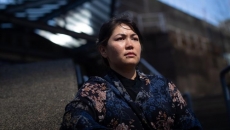SHOAL LAKE, ONTARIO, CANADA - An Indigenous community on the Manitoba-Ontario boundary is welcoming clean, running water for the first time in nearly 25 years.
Shoal Lake 40 First Nation celebrated the opening Wednesday of its new water treatment plant as well as a new school.
The First Nation advised residents on social media that tap water from a central public water system was safe to drink and use for household purposes.
The federal government said a long-term boil-water advisory for the community, which was issued in 1998 and was one of the longest in Canada, had been lifted.
Indigenous Services Minister Marc Miller was in the community for the celebration.
"The people of Shoal Lake 40 have fought hard for this day," Miller said on Twitter.
The First Nation was cut off from the outside world more than a century ago during construction of an aqueduct that supplies Winnipeg with its drinking water. The community's land became a man-made island only accessible by a ferry in the summer and a dangerous ice road in the winter.
The community advocated for years for an all-season transportation link and, in 2019, what became known as "Freedom Road" was completed.
Construction on the water treatment plant began soon after.
The news reached the campaign trail when Liberal Leader Justin Trudeau spoke Tuesday about the advisory lifting. He said his government is still committed to ending long-term boil water advisories, a promise the Liberals first made during the 2015 election campaign.
"Indigenous people who have lived on that land for generations and millennia can't drink the water. We're fixing that," Trudeau said.
Numbers from Indigenous Services Canada from Aug. 28 show there were still 51 long-term drinking water advisories in 32 communities. Some 109 advisories had been lifted since November 2015.






